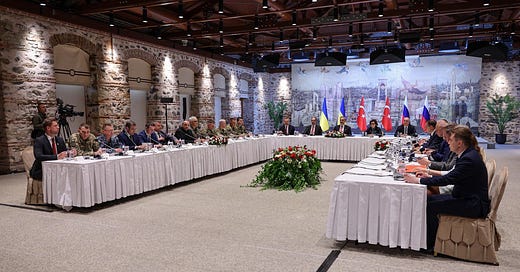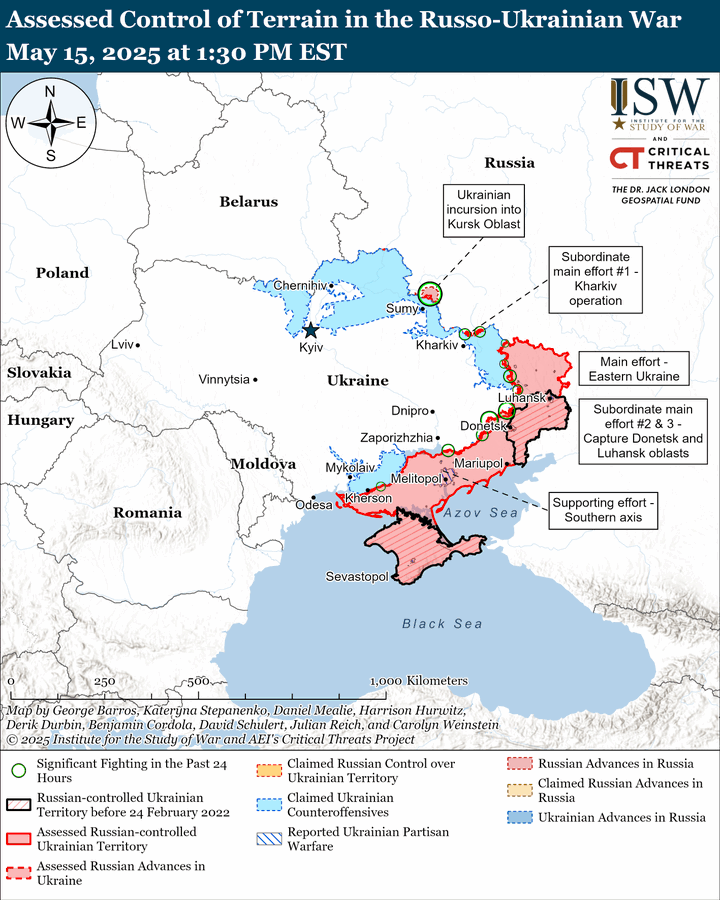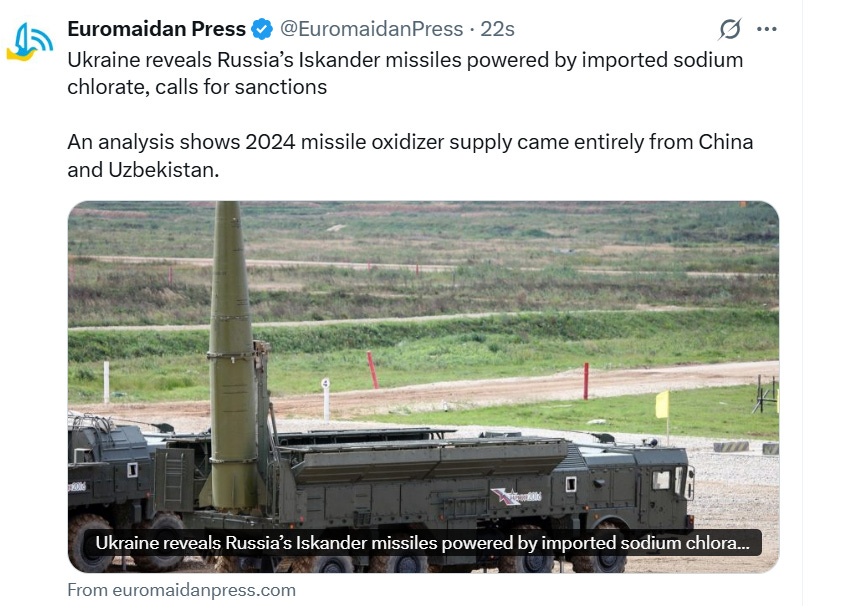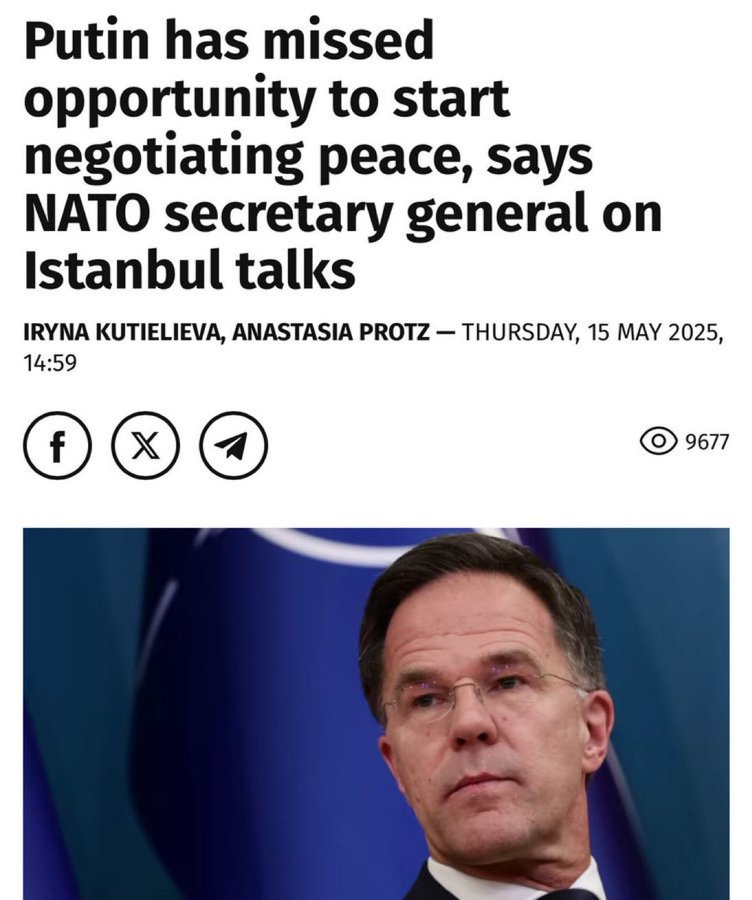May 17: E-Stories
InUkraine CombtSitRep BehindLines Russia-China InEurope InOtherNews Zabrisky ISW AsiaNoCyrillic Albania Istanbul CNinHungary RiehleFSB Mutler ChathamHouseFinland CipherBrief ScottLucas
Catching up…
For specific news about Trump, his regime and its dealings with Russia, I direct you to Olga’s substack. She and Julie Roginsky publish a weekly podcast, “Pax Americana”, which is highly informative.
For a general view of news from various geopolitical threatres, Scott’s EA Worldview is always superb.
NEW: Introducing EuroFile’s “What they Say” Series—articles and book chapters that are not available in print or in audio format, dedicated to the history of political and information warfare.
Stories we’re following…
Ukraine shot down 73 Shahed drones overnight and neutralized 36 decoy UAVs that failed to reach targets. Russia launched 112 drones from multiple directions. Air defense, EW units, and mobile groups responded.
Three civilians injured in a Russian drone attack on Odesa region, per Ukraine’s emergency service. Private homes, outbuildings, and a garage with 3 cars were destroyed.
Combat Situation
Ukraine lost another F-16 last night, the Air Force confirms. Around 03:30 on May 16, contact was lost during a combat mission. The pilot destroyed 3 targets and ejected safely — his life is not in danger.
ISW: Putin recently claimed that "Novorossiya" is an integral part of Russia, and Kremlin Spokesperson Dmitry Peskov defined "Novorossiya" as all of eastern and southern Ukraine, including Kharkiv, Dnipropetrovsk, Odesa, and Mykolaiv oblasts. Russia currently occupies a small portion of Kharkiv Oblast and the Kinburn Spit in Mykolaiv Oblast, and Russian forces are advancing towards the Dnipropetrovsk Oblast administrative border.
Ukrainian forces recently advanced near Toretsk, and Russian forces recently advanced near Lyman, Novopavlivka, and Velyka Novosilka.
Massive explosions rocked a military ammunition depot in occupied Crimea — fires and detonations still ongoing in Perevalne, road to Simferopol closed. Losses reported in the 126th Brigade & 8th Artillery Reg. In Podolsk, Russia — an industrial zone was hit, over 1,500 m² in flames after multiple blasts.
Upwards of 640,000 Russian soldiers fighting against Ukraine, Syrskyi says. Russia's ground forces participating in combat against Ukraine amount to upwards of 640,000 soldiers, Ukraine's Commander-in-Chief Oleksandr Syrskyi said on May 15.
Behind the Lines
Pro-Ukraine partisans sabotage railway track near Russia's Smolensk. The operation was carried out in Russia's Smolensk Oblast, a western region bordering Belarus, to disrupt arms and equipment shipments to Russian forces stationed at Ukraine's northeastern border.
WaPo: Amid a string of global attacks by Russian saboteurs, Latvia's intelligence agency is encouraging citizens to be wary of individuals posing as tourists. They warned that Russian saboteurs might attempt to incite unrest or assassinate “socially significant individuals.”
Trilateral talks kick off today in Istanbul. The first started at 10:45 — a meeting between Ukraine, the U.S., and Turkey. Then at 12:30, Ukraine, Turkey, and Russia are set to meet, according to Turkey’s Foreign Ministry.
Ukraine plans to discuss only ceasefire with Russia at Istanbul talks, media reports. When asked by the Kyiv Independent, a source close to the Presidential Office did not confirm whether Ukraine would still hold the talks if Putin does not join.
Russian delegation opposes U.S. presence at direct talks with Ukraine. According to Russian media, the Turkish representative is also expected to leave after opening remarks.
Trump says he's returning to US, expects to meet Putin 'as soon as we can set it up.' "I think it’s time for us to just do it," U.S. Presidnet Donald Trump said in Abu Dhabi, adding that the meeting between the two would happen "as soon as we can set it up."
Ukraine is ready for a full and unconditional ceasefire and direct talks at the highest level — Defense Minister Umerov & head of the Ukrainian delegation. He said the trilateral meeting with the U.S. and Turkey was productive. Peace is only possible if Russia commits to real steps: a 30-day ceasefire, return of deported Ukrainian children, and POW swaps on an “all for all” basis.
Turkish FM Hakan Fidan: We believe these talks could lead to peace.
"The talks in Istanbul offer two paths — one leading to peace, the other to more destruction. These discussions could pave the way for a future meeting between leaders. This is the first high-level Russia-Ukraine meeting since 2022, and Turkey remains committed to peace efforts."
Russia's demands at the talks are unrealistic and go far beyond what was previously discussed, Reuters reports citing a Ukrainian diplomatic source. Moscow is reportedly demanding that Ukraine withdraw troops from what it calls "its territory" to agree to a ceasefire — among other new conditions. The talks lasted less than two hours. Unconfirmed rumors spreading in Russian media claim Russian delegation leader Medinsky voiced the following demands to Ukraine in Istanbul:
1. Neutral status like Austria (no foreign troops/WMDs);
2. No war reparations from either side;
3. Rights for Russian speakers and end to “nationalist propaganda”;
4. Recognition of Russia’s claims to Donetsk, Luhansk, Kherson, Zaporizhzhia and Crimea;
5. Immediate ceasefire tied to Ukrainian withdrawal from these regions.
Russia delegation leader Medinsky made key statements: "We have taken note of the request for a meeting between the leaders of Russia and Ukraine. The negotiations have concluded, and we are generally satisfied. Russia and Ukraine will soon carry out a prisoner exchange based on the 1000-for-1000 formula. Both sides will present their vision of a potential ceasefire in detail, and negotiations will continue afterward."
Russian MP Yevgeny Popov confirmed that Russia threatened to seize not five as previously claimed, but six more Ukrainian regions if Kyiv refuses to recognize the four already claimed. “This was said behind closed doors — we can confirm it,” Popov stated, citing sources close to the talks.
"What we saw yesterday and last night is further proof that Putin is not serious about peace. He has fled," says Starmer.
"It's crucial that we maintain full unity with our allies. We will continue working on this today to make it clear: there must be a ceasefire, but if not, we will act together on sanctions."
European summit in Albania to focus on tougher sanctions against Russia, Politico reports. European Commission President Ursula von der Leyen said the next set of EU sanctions will target Nord Stream, more "shadow fleet" listings, a lower oil price cap, and new measures targeting Russian and third-country banks aiding the war effort, according to the Kyiv Independent reporter.
President Zelensky, President Macron, Chancellor Merz, Prime Minister Starmer, and Prime Minister Tusk had a phone call with Trump. Details will be released soon — Presidential Press Secretary Nikiforov.
La Stampa: The Vatican wants to host peace talks between Zelensky and Putin: Pope offers to mediate, – La Stampa. After Putin ignored peace efforts in Turkey, the Vatican called it “tragic” and expressed readiness to help end the war.
. FT: How Ukraine lost hundreds of millions on arms deals gone wrong
Russia’s invasion of Ukraine in 2022 marked Europe’s single-biggest weapons procurement rush since the second world war. While Ukraine’s Nato allies delivered vast amounts of military aid, the country’s own officials were also forced to find ways to supply troops fighting across a 1,000-kilometre front line.
A Financial Times investigation, based on leaked Ukrainian state documents, court filings and dozens of interviews with procurement officials, weapons dealers and manufacturers, and detectives, has uncovered how hundreds of millions of dollars Kyiv paid to foreign arms intermediaries to secure vital military equipment has gone to waste over the past three years of war.
BBC News: Two firefighters and a member of the public have died in a large fire at a business park and former RAF base in Oxfordshire.
In an emotional statement, the county's chief fire officer praises the "unwavering bravery" of emergency services and says more details on the victims will come later
The firefighters died while tackling the blaze at Bicester Motion on Thursday - the fire is now under control and the cause isn't yet known.
Meanwhile in Russia & China…
Meduza: The Kremlin has instructed Russia’s news media to prepare the public for no breakthroughs in Istanbul
Meduza has learned that Russia’s state-controlled news media have received instructions from the Kremlin’s domestic policy team to portray this week’s negotiations in Turkey as a distinctly Moscow-driven event. Propagandists are advised to stress that “neither anything Donald Trump said nor anything Zelensky declared” influenced how Vladimir Putin assembled Russia’s delegation. The core public message is continuity, underscored by the return of presidential aide Vladimir Medinsky, who led Moscow’s delegation during the last Istanbul talks in 2022. The Kremlin instructed media outlets to emphasize that his role in this week’s negotiations is “only logical.” Meduza columnist Andrey Pertsev reviews the standing orders for Russian propagandists as Moscow and Kyiv return to the same negotiating table for the first time in more than three years.
Putin appoints general who led Mariupol assault as new Russian Ground Forces Commander. Under Andrey Mordvichev’s command, Russian troops carried out the destruction of civilian infrastructure and committed atrocities against both civilians and the Ukrainian military, Ukraine has said.
Vladimir Putin has fired Russia’s chief of land forces, Gen Oleg Salyukov, the Kremlin confirmed.
Salyukov, 70, had been in charge of Russia’s land forces since 2014, overseeing involvement in the Syrian civil war and the offensive on Ukraine. Less than a week ago, he was running the Victory Day military parade in Moscow’s Red Square to mark the 80th anniversary of victory over Nazi Germany.
The Insider: Russian botnet begins sending out fake European articles defending Putin’s decision not to meet with Zelensky in Istanbul
The Russian bot network Matryoshka has begun distributing fake articles presented as editorials by major Western media outlets. The stories feature headlines about Vladimir Putin supposedly outplaying Volodymyr Zelensky with regard to peace talks in Istanbul. The narratives focus on the ostensibly falling approval ratings of the Ukrainian president, along with the purported humiliation that Zelensky suffered after Putin refused to take up his counterpart’s offer to engage in direct dialogue regarding a potential diplomatic solution to the ongoing war.
Spinning the Soviet WW2: In early May, Russia’s Security Council published a collection of propaganda essays dedicated to the 80th anniversary of the Soviet Union’s victory in World War II. Federal politicians, top security officials, and Kremlin aides contributed, and President Vladimir Putin even penned an address to readers.
But in offering their takes on how Soviet leaders’ decision-making led to the defeat of Nazi Germany, these high-level Russian officials often attempt to rewrite or completely contradict the historical record. For Meduza, historian Alexey Uvarov breaks down the most striking (and unexpected) examples of how the collection manipulates Soviet history — and what it reveals about the state of mind of Russia’s ruling elite today.
Russian authorities arrest employees of largest publishing house over alleged ‘LGBT propaganda’ in books
On May 14, in the Kremlin’s latest crackdown on the publishing industry, Russian security forces questioned staff of Eksmo, the country’s largest publishing house, and arrested about 10 employees. State media reported that the case is part of a criminal investigation tied to content in books labeled “LGBT propaganda” by the authorities.
The Cipher Brief: CHINA & RUSSIA - A NUCLEAR PLANT ON THE MOON? – We’ve reported and written on a whole range of China-Russia collaborations; now the two nations have signed an agreement to build a nuclear power plant on the moon, to provide energy for the International Lunar Research Station (ILRS), which is projected to be operational by 2036. The agreement was reportedly signed during Chinese leader Xi Jinping's visit to Moscow last week.
China and Russia have pledged to establish the ILRS on the moon's south pole by the mid-2030's. The idea is for it to conduct space research and test technologies for establishing a long-term human presence on the moon. The nuclear power plants being designed by China and the U.S. are expected to produce around 40 kilowatts of electrical power for a decade, equivalent to the power used by 33 American households.
VSquare: Recyling Cowboys—How Russian Scammers Built a Financial Pyramid out of Trash
What connects a GRU saboteur to a financial pyramid based in Poland? The man who sent explosive DHL parcels from Vilnius in July 2024—one of which detonated in a parcel truck near Warsaw—once served as a frontman for Recyclix, a Ponzi scheme created by Russians and registered in Poland. Recyclix turned out to be a testing ground for an even bigger fraud: the Juicy Fields scandal, in which the masterminds duped 550,000 people, mostly Europeans, out of €645 million. Who are the people behind Recyclix and Juicy Fields? What links them to the Kremlin? And how did stolen investor money end up funding a military drone factory near St. Petersburg? In the first part of investigation from FRONTSTORY.PL, Daniel Flis uncovers a reality as twisted as a con man’s alibi. The story leaps across continents—from posh banquets on the French Riviera to shady dealings in post-Soviet capitals. There are fake aristocrats, medical marijuana, private jets, and a guest appearance by none other than Polish President Andrzej Duda. Read the first part of the story here and the original version in Polish here.
RUSI: History is a Strategic Necessity for Negotiations with Russia
Peace negotiations with Russia require more than a contemporary understanding of events, and diplomats would do well to recognise the patterns Russia’s past teach us.
Russia is reportedly mobilising 160,000 new troops, ramping up its war efforts in Ukraine. Meanwhile, President Trump is eager to broker a peace deal, despite remaining obstacles and with limited US support for Ukraine. The burden of leadership is increasingly on the Coalition of the Willing – led by the UK and France and composed of states committed to supporting Ukraine.
Regardless of whether current diplomacy succeeds, Russia will pose the central threat to European security. This requires a strong, coherent long-term strategy. Such a strategy must incorporate historical ‘tools’ alongside other approaches. While policymakers in the field of international relations do recognise the importance of historical knowledge and skills, it is often lacking a structural integration in the onboarding processes for new diplomats and policymakers.
Tool 1: Understanding Russia’s historical narrative
Tool 2: Learning from analogies and precedents
Tool 3: Contextualising the war—historical tools at the strategic level
In the EU…
Poland is preparing its 47th military aid package for Ukraine, worth €200 million, according to Piotr Lukasiewicz, head of the Polish Embassy in Ukraine. It will be transferred in the coming months. The package may also include F-29s.
Chancellor Merz confirms the 17th EU sanctions package against Russia will be adopted on May 20. It targets Russia’s "shadow fleet" and includes blacklisting 200 oil tankers and sanctions on Russian citizens for cyberattacks and human rights violations.
President Zelensky met with Dutch PM Dick Schoof to discuss air defense, investment in Ukraine’s defense industry, and pressure on Russia to achieve a full ceasefire. “This year, the Netherlands nearly tripled its defense aid. We value this contribution to protecting lives,” Zelensky said.
Ukraine-Russia peace efforts could see progress within 2 weeks, NATO chief says. "I think there is this window of opportunity this week, but also in the next 10 days, two weeks, to really bring the whole issue of Ukraine to a better place," NATO Secretary General Mark Rutte said.
IntelNews.Org: THE EUROPEAN UNION IS considering building its own military satellite network in an effort to reduce or eliminate its reliance on American satellite capabilities, according to reports. The London-based Financial Times newspaper said on Saturday that the exploratory project is being led by Andrius Kubilius, a veteran Lithuanian politician who is serving as the European Commissioner for Defense Industry and Space.
Speaking to The Financial Times, Kubilius confirmed that the European Union is considering the construction of a low Earth orbit (LEO) satellite system. Such a system would complement the European Union’s existing Copernicus Earth observation program, which is managed by the European Commission in partnership with the individual European Union member states. The costs and benefits of Copernicus are shared by member states and by several agencies, including the European Space Agency, the European Environment Agency, and the European Maritime Safety Agency.
Unlike Copernicus, a new LEO satellite system would primarily satisfy military priorities and would generate imagery updates every 30 minutes, thus providing near-real-time intelligence on targets. In contrast, Copernicus satellites are able to generate new imagery every 24 hours. Moreover, a new LEO satellite system would integrate into IRIS², an internet network of multi-orbit satellites intended to provide on-demand location-tracking, security surveillance and secure communications links to European Union member states. IRIS² is scheduled to become operational in 2027.
In his comments to The Financial Times, Kubilius acknowledged that the idea for a new European Union LEO satellite system was sparked by “changes in the geopolitical situation” relating to the United States. Subsequently, the European Union is exploring ways to “reduce its reliance on United States military assets”, he said. The commissioner admitted that such a project would be costly—perhaps in excess of $540 billion—as well as time-consuming. But there was much desire to proceed, he said.
In the meantime, the European Union is considering “commercial alternatives” until an independent European Union-run satellite network becomes fully operational, according to the The Financial Times.
Universul: Romania’s presidential frontrunner candidate rebuked after calling opponent “autistic”
Romania’s presidential frontrunner candidate George Simion has been rebuked after calling his opponent “autistic”. “Autism Romania” Association on Thursday called the remarks “abusive and harmful.” Simion made the comments to a television reporter on Thursday, suggesting the channel supported “an autistic person, poor thing.”
Ukrainska Pravda: Why are Romanians backing a pro-Russian president and what’s next?
A small portion of the electorate clearly understands that George Simion is pro-Russian. But many voters inside Romania – and a majority of Romanians abroad – don’t pay attention to what Simion has said recently about Ukraine, Russia or the EU. And when they do hear explanations about his positions, they often don’t believe them.
In fact, among his supporters, there is a myth that Simion is pro-American. But his past activities suggest otherwise, pointing to ties with Russia’s FSB and connections in Moscow. (Note: Several recent journalistic investigations in Romania have revealed Simion’s suspected pro-Russian operations in Moldova and the awarding of Russian contracts to his close associates.)
It’s paradoxical: people claim to be anti-Russian, yet they vote for George Simion, without seeing the contradiction, because for most Romanians, these elections aren’t really about Russia.
The main driver behind this shift is disillusionment with the two dominant political parties: the center-left PSD and the center-right PNL. Despite ongoing corruption scandals, these parties have managed to cling to power.
SUPO Intelligence Report: When the war in Ukraine ends, Russia will transfer the resources it frees up elsewhere. This also means an increasingly greater threat to Finland.
(SUPO is the Security Police is a security and intelligence service under the Ministry of the Interior, tasked to to prevent and combat the most serious threats to national security.)
The threat posed by Russia to Finland is serious and there is no sign of improvement. When the war in Ukraine ends, Russia's resources will be freed up for influence elsewhere. Russia is willing to pursue its political goals by all means, but the end of the war in Ukraine will also improve its ability to engage in hostile activity elsewhere in Europe.
In the situation of both intelligence and broad influence, the use of proxy actors by various states has recently become more prominent. One example of the use of proxy actors is the sabotage activities in Europe linked to the Russian military intelligence service GRU. By using intermediaries, Russia wants to cover its tracks. With sabotage, Russia seeks to influence public opinion, the sense of security of citizens, and to burden the authorities. The current main goal is to weaken Western support for Ukraine.
Finland has not been the target of strong Russian influence so far, which has primarily targeted large EU countries and countries with large Russian minorities or pro-Russian parties. However, the situation is likely to change when Russia is able to redirect its resources tied to Ukraine.
Both Russia and China target Finland with continuous and active espionage. Finland is also of intelligence interest to some third countries, such as Iran. Cyber activities targeted at Finland by Russian intelligence services have increased and become even more specific, mainly targeting state administration and foreign and security policy.
In other news…
WaPo: You might be able to claim a piece of Apple’s $95 million Siri settlement.
In January, Apple settled a lawsuit that argued its Siri virtual assistant recorded people’s conversations without their consent. Apple denied wrongdoing. If you’ve noticed Siri listening when you didn’t ask it to, file a claim before July 2 — here’s how. And if this case makes you paranoid, that’s probably justified.
The Cipher Brief: CHINA-US TRADE WAR: ONE STEP FORWARD, ONE STEP BACK – China has temporarily lifted export restrictions targeting 28 American companies, as part of the trade agreement reached by Treasury Secretary Scott Bessent and Chinese Vice Premier He Lifeng in Switzerland last weekend, CNBC reported Thursday.
That was the good news on the U.S.-China front. Not so good: reports that China will keep in place restrictions on seven rare earth metals, metals that are essential for U.S. defense, energy and automotive industries.
“There is not one thing that we use in the industry that doesn’t have some type of critical mineral or rare earth element,” Dak Hardiwck, a Vice President at the Aerospace Industries Association, told The Cipher Brief. The Beijing restrictions, he said, is “certainly is a big thing for our industry. It is something that is top of mind for our companies, especially as they source globally for parts of components needed for a global industry.”
WaPo: The cost of Trump’s military parade in D.C. next month could reach $45 million. It will coincide with Trump’s birthday — protesters are getting ready.
Bloomberg: Who's Paying to Dim the Sun? We Should Know.
Funding for solar geoengineering is growing as rapidly as the public discourse around its research and development, but it’s not a climate-change solution.
Not long ago, the idea of dimming the sun would be considered either outlandish or taboo. A new analysis reveals that neither of those things is entirely true anymore, as the funding going into the field of solar geoengineering — techniques that aim to soothe the symptoms of climate change by reflecting more of the sun’s heat back into space — is increasing as rapidly as the public discourse around its research and development.
From the altering of weather patterns to the potential of termination shock, any eventual deployment of such geoengineering technologies would have profound effects on the entire planet. While research is key to filling the huge gaps in our knowledge on the risks and benefits, we also have to ensure that the science is done responsibly and answers the questions that are most in the public interest. Transparency is therefore essential to ensure high ethical standards and prevent misinformation.
The UK government published a position on solar geoengineering in 2020: “The Government is not deploying SRM, and has no plans to do so.” But many scientists and activists are concerned about a “slippery slope” toward deployment. Meanwhile, though ARIA’s climate cooling program has an independent oversight committee and states commitments to good governance, it’s not subject to Freedom of Information laws. This is to enable the unit operational freedom to undertake high-risk, novel projects, yet such an approach doesn’t lend itself to building or maintaining trust.
WaPo: President Donald Trump is wrapping up his Middle East tour today.
Trump visited a mosque in Abu Dhabi yesterday — a remarkable gesture. The tour has revealed his contradictory foreign policy approach. Israel has ramped up strikes in Gaza during Trump’s trip. The president’s recent dealmaking has alarmed Israeli analysts, who fear he is sidelining the country.













